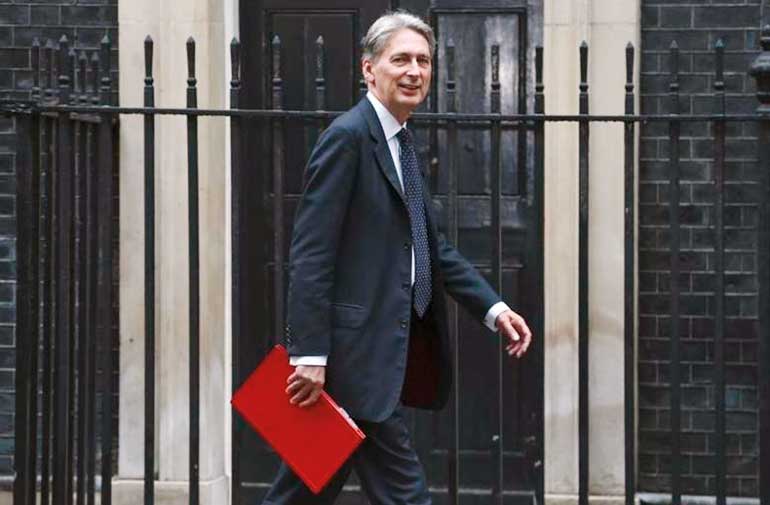Tuesday Feb 24, 2026
Tuesday Feb 24, 2026
Monday, 15 August 2016 00:01 - - {{hitsCtrl.values.hits}}
 Britain's Chancellor of the Exchequer Philip Hammond arrives for a meeting of the ''Cabinet Committee on Economy and Industrial Strategy'' at Number 10 Downing Street in London, Britain 2 August, 2016 - REUTERS
Britain's Chancellor of the Exchequer Philip Hammond arrives for a meeting of the ''Cabinet Committee on Economy and Industrial Strategy'' at Number 10 Downing Street in London, Britain 2 August, 2016 - REUTERS
LONDON (Reuters): Britain will fill a gap of as much as GBP 4.5 billion($5.8 billion) in funding for agriculture, universities and its regions that will open up when Britain leaves the European Union, finance minister Philip Hammond said.
Scientists, farmers and others who got EU funding were facing uncertainty after Britain voted on 23 June to quit the EU. Hammond reassured them on Saturday that the British government would pick up the tab.
The new guarantee over funding comes as Britain faces the looming prospect of a recession following the Brexit vote. Companies are expected to put off investment and consumers to cut their spending as Britain and the EU work out their new relationship.
Hammond told reporters that Britain needs about GBP 4.5 billion a year to fill the gap left by the end of EU funding, although Britain’s actual exit date may be some way off. Prime Minister Theresa May has said she will not start the two-year process of leaving this year.
“We recognise that many organisations across the UK which are in receipt of EU funding, or expect to start receiving funding, want reassurance about the flow of funding they will receive,” Hammond said in a statement. According to Full Fact, an independent fact-checking agency, the British government paid about GBP 13 billion to the EU last year, after its automatic rebate, and got back GBP 4.5 billion in funding.
“Clearly if we stopped making contributions to the European Union there will be money available to be invested in our own economy,” Hammond said when reporters asked about Britain’s funding arrangements after Britain’s departure from the EU.
Britain’s opposition Labour Party said Hammond had made the right move in giving the guarantees but added that it was important for the government to also ensure that Britain remained a member of the European Investment Bank.
The EIB, a provider of long-term financing on favourable terms to projects that support growth in the bloc, in 2015 invested 7.8 billion euros ($8.7 billion) in Britain in transport, water and other projects.
Hammond’s funding guarantee, which covered structural and investment funds and Horizon research funding, was also welcomed by organisations representing recipients of EU funding and by the employer organisation, the British Chambers of Commerce.
“I hope that this short-term certainty will help to deliver longer-term confidence and this is exactly what farm businesses need now,” said Meurig Raymond, the president of the National Farmers’ Union.
The Royal Society, a London-based group of scientists, said the reassurance on EU grants would help Britain-based research continue to attract the best talent.
“Today’s announcement sends a strong message that Britain remains open and collaborative,” Royal Society president Venki Ramakrishnan said.
Hammond said projects signed before Britain’s Autumn Statement financial update will continue to be funded by Britain after it formally leaves the EU and the UK would match the current level of agricultural funding until 2020.
Reuters: Britain could leave the European Union towards the end of 2019, instead of early that year as expected by some politicians, reported the Sunday Times citing sources who have been briefed by ministers that Brexit departments were not ready.
The UK voted to leave the EU on June 23, but Prime Minister Theresa May has said she will not invoke “Article 50”, the two-year formal process for divorcing the bloc, this year as the country needs time to prepare for negotiations.
Britain’s international trade minister, Liam Fox, said in July that early next year could be the best time for Britain to trigger the divorce talks. But Article 50 could be invoked later than that, City sources who had been privately warned by ministers told the Sunday Times, with any delays a result of new government departments set up to handle Brexit and international trade not yet being fully staffed.
Elections in France in May, and Germany in September, could also push back the timing of Britain triggering Article 50, reported the newspaper.
Any delay to the Brexit process is likely to draw criticism from the pro-leave side of May’s Conservative party, with senior members such as John Redwood calling for a quick departure from the bloc.